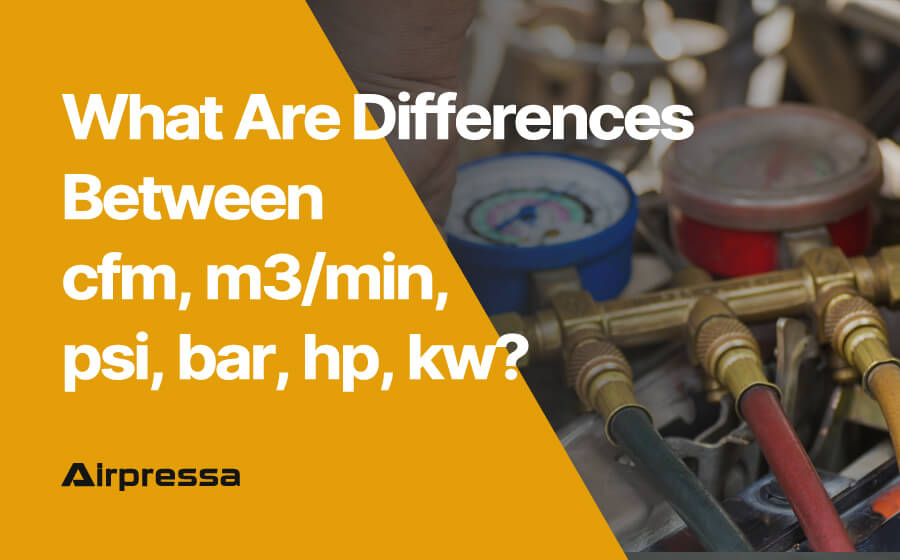
Air compressors are essential machines in many industries, and they come in different types and sizes. When choosing an air compressor, it’s important to understand the different measurement units used to describe their performance.
Want to learn more about the differences between 3/min, cfm, psi, bar, hp, and kW? You have come to the right place.
You can click on any section that you interest to get there quickly.
What Are Differences Between CFM and m3/min in Air Compressors?
Firstly, let us understand what CFM and m3/min stand for. CFM stands for cubic feet per minute, and m3/min stands for cubic meters per minute.
They are both measurements of air volume flow rate, commonly used in the air compressor industry.
For more detailed cfm knowledge, please click here: What Is CFM in Air Compressor And How To Calculate It?
However, there is a significant difference between the two units of measurement. CFM is based on cubic feet, while m3/min is based on cubic meters. This means that the same flow rate can have different values depending on which unit of measurement is used.
Another significant difference between the two is the different standards of measurement used in different regions. CFM is mainly used in North America, while m3/min is widely used in Europe, Asia, and other regions.
This means that when purchasing an air compressor, it is crucial to understand which unit of measurement is used in your region and select the appropriate unit to ensure compatibility with other equipment.
And you need to pay attention to the data provided by the supplier.
When comparing air compressors from different suppliers, it is essential to convert CFM to m3/min or vice versa to ensure accurate comparison. The conversion factor is 0.0283, which means one cubic meter equals 35.3 cubic feet.
Here is a formula: 1 m3/min = 1CFM * 0.0283
For example:
The CMF of an air compressor is 100, then the m3/min should be 100*0.0283=2.83 m3/min.
What Are Differences Between PSI and Bar in Air Compressors?
PSI and Bar are very common in the air compressor industry, and they are both pressure units
PSI stands for “pounds per square inch,” and it is a unit of pressure commonly used in the United States.
On the other hand, Bar is a metric unit of pressure, used worldwide except for the United States.
1 Bar is equivalent to 14.5 PSI. Therefore, PSI and Bar are different units of pressure, but they can be converted into each other.
Secondly, when it comes to air compressors, PSI and Bar are used to indicate the maximum pressure the compressor can produce.
This is also known as the “pressure rating” of the compressor. For example, an air compressor with a pressure rating of 100 PSI can generate a maximum pressure of 100 PSI. Similarly, an air compressor with a pressure rating of 7 Bar can generate a maximum pressure of 7 Bar.
Thirdly, the choice of pressure unit depends on the application and the country where the air compressor is being used. In the United States, PSI is commonly used, while Bar is more common in Europe and other parts of the world.
However, most air compressors have a pressure gauge that displays both units of measurement, so users can switch between the two if necessary.
Finally, it is important to note that the pressure rating of an air compressor should not be exceeded as it can lead to equipment failure or even injury. Therefore, it is crucial to select an air compressor with the appropriate pressure rating for the intended application.
What Are Differences Between hp and kw in Air Compressors?
- hp is an abbreviation for horsepower
- kw is an abbreviation for kilowatt
What are horsepower and kilowatts? Horsepower is a unit of power used in the United States, while kilowatts are the standard unit of power used globally. Both units measure the power output of a machine or engine.
In air compressors, hp is commonly used to describe the power of the motor that drives the compressor pump. And kw is used to measure the actual power output of the compressor itself.
One of the main differences between horsepower and kilowatts is their conversion factor. One horsepower is equal to 0.7457 kilowatts. Therefore, if you know the horsepower rating of an air compressor, you can easily convert it to kilowatts by multiplying it by 0.7457.
Another difference between these two units is their accuracy. Kilowatts provide a more accurate measurement of the actual power output of the compressor, while horsepower is more commonly used as a general indicator of power.
It’s important to note that when selecting an air compressor, the horsepower rating should not be the sole factor in your decision. Other factors such as the compressor’s flow rate, tank size, and pressure rating should also be considered.
A higher horsepower rating does not necessarily mean a better air compressor, as a compressor with a lower horsepower rating but a higher flow rate and pressure rating may be more suitable for your needs.
Hope this article have explained cfm, m3/min, psi, bar, hp, and kw in the air compressor clearly.
But if you still you are still confused, you can contact us for detailed purchasing guidance.
Our experts will help you provide you with a complete solution in terms of industry, cost, efficiency, energy saving, noise, lubrication or oil-free air compressor, to save cost and time.